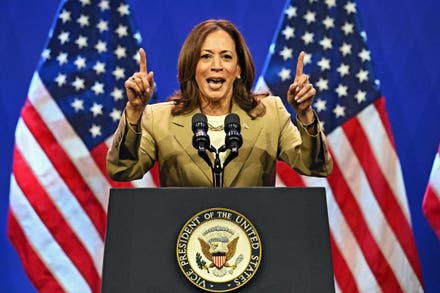What A Harris Presidency Could Mean For Crypto

- Share to Facebook
- Share to Twitter
- Share to Linkedin
PHILADELPHIA, PENNSYLVANIA – JULY 13: Vice President Kamala Harris speaks during a campaign event at … [+]
Getty Images
Following President Joe Biden’s decision to step out of the race for the Democratic presidential nomination, Vice President Kamala Harris has become the presumptive nominee. This change has sparked a new wave of excitement among younger voters and set off a race in Washington policy circles to determine her positions on various issues.
Despite spending over two decades in elected positions, having become District Attorney of San Francisco in 2004, Harris is still a policy enigma in certain areas. She spent most of her career as a public prosecutor, moving to serve as the California Attorney General until she entered the Senate in 2017. She has often framed herself as a progressive, but there is uncertainty over whether this is her philosophy or more of a practical choice being from California. However, her California ties have brought her closer to the tech industry than some other progressives and has meant her criticism of the sector has been more moderate than some of her peers.
Crypto is one of the areas where there is some uncertainty over how Harris may approach the industry. Some are optimistic that this could mean she is a blank slate and open to being persuaded by different viewpoints. Mark Cuban told Politico, “She will be far more open to business, AI, crypto.” Indicating an openness to a more industry-friendly regime or a desire to establish clearer regulations for the industry could be an easy way for Harris to win more campaign donations from businesses and investors in her home state.
Given her background as supporting progressive policies and friendliness toward the tech industry, it is easy to imagine a world where Harris embraces crypto. Other progressives have touted how digital assets can make financial services more accessible and a means to force more competition on traditional financial services businesses, a group she has clashed with in the past. The message of inclusion and accessibility would likely play well to Harris, who has routinely tried to make “policy decisions through the lens of women, children, and minority communities,” according to the Wall Street Journal.
However, there is also a case that can be made that Harris, who is not expected to deviate from Biden’s policies significantly, does not provide the relief the industry is hoping she may bring. Hailing from California, she could have concerns about federal pre-emption and may want any laws to preserve the ability for states to set stricter standards rather than having federal rules be the maximum. In addition, Harris could decide to leave the issue to the regulators, who may be more inclined to continue with regulation by enforcement, particularly with some of the challenges that rulemaking will face after this year’s Supreme Court rulings. Lastly, even if Harris is more friendly to the tech industry, she will likely want to avoid being seen as pursuing an industry-written policy. This could mean that even if regulation is enacted, it does not reflect what industry members hope to achieve.
Google Confirms Bad News For 3 Billion Chrome Users—You Will Still Be Tracked
Here’s Why Biden Says He Dropped Out—In First Speech Since Leaving 2024 Race
Today’s NYT Mini Crossword Clues And Answers For Thursday, July 25
function loadConnatixScript(document) {
if (!window.cnxel) {
window.cnxel = {};
window.cnxel.cmd = [];
var iframe = document.createElement(‘iframe’);
iframe.style.display = ‘none’;
iframe.onload = function() {
var iframeDoc = iframe.contentWindow.document;
var script = iframeDoc.createElement(‘script’);
script.src = ‘//cd.elements.video/player.js’ + ‘?cid=’ + ’62cec241-7d09-4462-afc2-f72f8d8ef40a’;
script.setAttribute(‘defer’, ‘1’);
script.setAttribute(‘type’, ‘text/javascript’);
iframeDoc.body.appendChild(script);
};
document.head.appendChild(iframe);
const preloadResourcesEndpoint = ‘https://cds.elements.video/a/preload-resources-ovp.json’;
fetch(preloadResourcesEndpoint, { priority: ‘low’ })
.then(response => {
if (!response.ok) {
throw new Error(‘Network response was not ok’, preloadResourcesEndpoint);
}
return response.json();
})
.then(data => {
const cssUrl = data.css;
const cssUrlLink = document.createElement(‘link’);
cssUrlLink.rel = ‘stylesheet’;
cssUrlLink.href = cssUrl;
cssUrlLink.as = ‘style’;
cssUrlLink.media = ‘print’;
cssUrlLink.onload = function() {
this.media = ‘all’;
};
document.head.appendChild(cssUrlLink);
const hls = data.hls;
const hlsScript = document.createElement(‘script’);
hlsScript.src = hls;
hlsScript.setAttribute(‘defer’, ‘1’);
hlsScript.setAttribute(‘type’, ‘text/javascript’);
document.head.appendChild(hlsScript);
}).catch(error => {
console.error(‘There was a problem with the fetch operation:’, error);
});
}
}
loadConnatixScript(document);
What will likely be the deciding factor in how crypto policy evolves under Harris are the advisers around her and the leaders of her regulatory agencies. There is an old Washington adage that “personnel is policy,” and with Harris not appearing to hold strong personal views on digital assets, it will likely be true in this case. It is uncertain whether she would look to have new chairs at key regulatory agencies like the Securities and Exchange Commission or the Commodity Futures Trading Commission. However, without Democratic control of the Senate, the odds of a change in leadership go down. Other critical positions, like Secretary of the Treasury, are more likely to see a change, even if Republicans have a majority in the Senate. Former President Donald Trump’s re-election likely still spells the best outcome for the crypto industry, but the unknown that Harris represents currently has fairly sparked some optimism.



